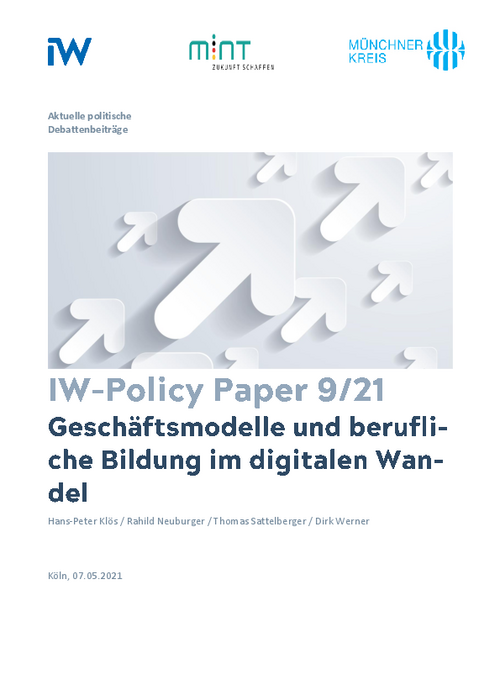The technology driven development of business models is of great importance for the future of vocational education and training. Digital competencies - such as digital literacy, interaction, collaboration, and learning - are an indispensable part of vocational training for a modern working world to qualify future skilled workers for their professional life.

Business Models and Vocational Training in the Digital Transformation

The technology driven development of business models is of great importance for the future of vocational education and training. Digital competencies - such as digital literacy, interaction, collaboration, and learning - are an indispensable part of vocational training for a modern working world to qualify future skilled workers for their professional life.
Although the current reorganisation of professions is already noticeably characterised by digitisation-related pressure to adapt, the ongoing development of job profiles still takes insufficient consideration of the future, rather disruptive changes caused by technological dynamics. Within the framework of the reorganisation, vocational training modules should therefore be defined to provide general, occupational, and specialised competences (optional or additional qualifications).
The development of business models, the organisation of work and the acquisition of vocational competences must be understood as a "magic triangle" and considered as an integrated entity. The adaptation of vocational education and training in terms of content, organisation and processes must not be exclusively path dependent. For business models that have been less considered in the VET system so far (especially in the C2B and C2C sectors), their increasing relevance should lead to even greater reflection on whether and which new or modified qualification requirements emerge beyond the dual VET system. Competencies across occupations should be strengthened through generalisation and modularisation. Due to more frequent changes between occupations and job profiles, interdisciplinary competences are becoming increasingly important. Vocational competences must therefore be strengthened and both education and training must be modularised to simplify transfers between occupations and qualifications.
This transformation must be supported by qualifying learners for lifelong, autonomous, and self-organised learning, but also by qualifying teachers to assume their role as impulse givers, learning process facilitators or coaches. Companies should be equipped to provide access to relevant learning content in the respective problem and work context either through access to internal or external learning platforms or the use of smart education spaces. Vocational schools should be enabled to act as strong partners within the dual system by providing adequate equipment, qualified teaching staff and organisational flexibility. In the same way, universities should prepare future vocational schoolteachers for their new role and responsibilities through much closer cooperation with the training practice. Both established and new players in the VET system should be enabled to develop digitally supported learning content and formats that can be established on company-internal or external learning platforms. The realisation of these concepts should be facilitated by the development of suitable financing models, for example within the framework of a Digital Pact for Vocational Education and Training.

Business Models and Vocational Training in the Digital Transformation

More on the topic

Digital Training: A question of Technology, Resources or Motivation?
The degree to which companies in Germany have digitalised their vocational training, if at all, is influenced by a variety of factors.
IW
Employees in the renewable energy sector: Renaissance of vocational training?
In order to master the ecological transformation of the real economy, many qualified specialists will be needed in the coming years.
IW